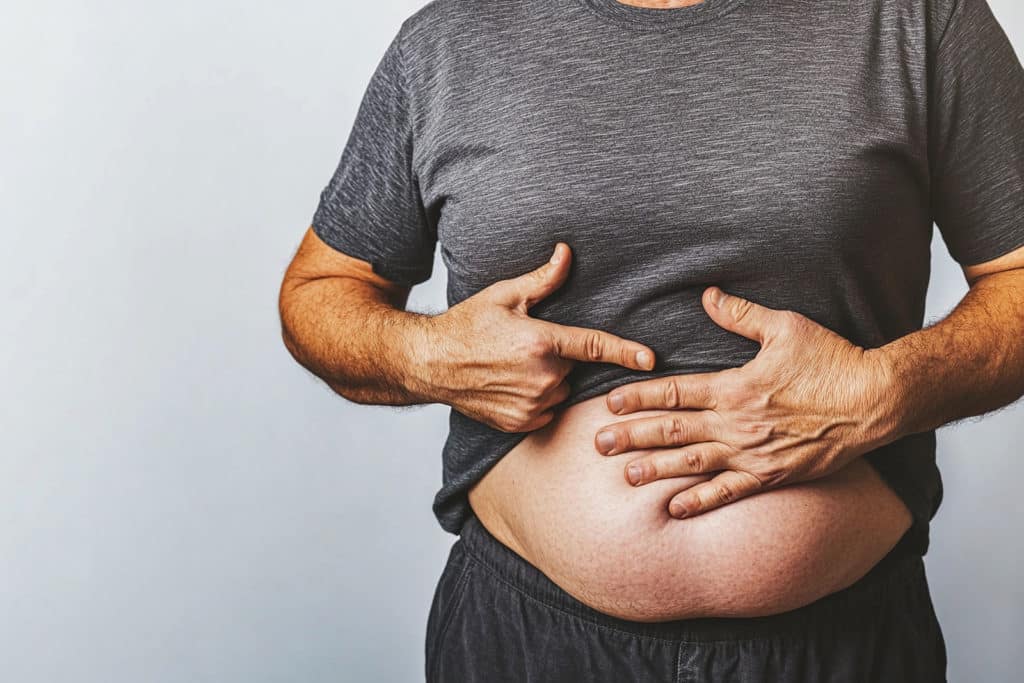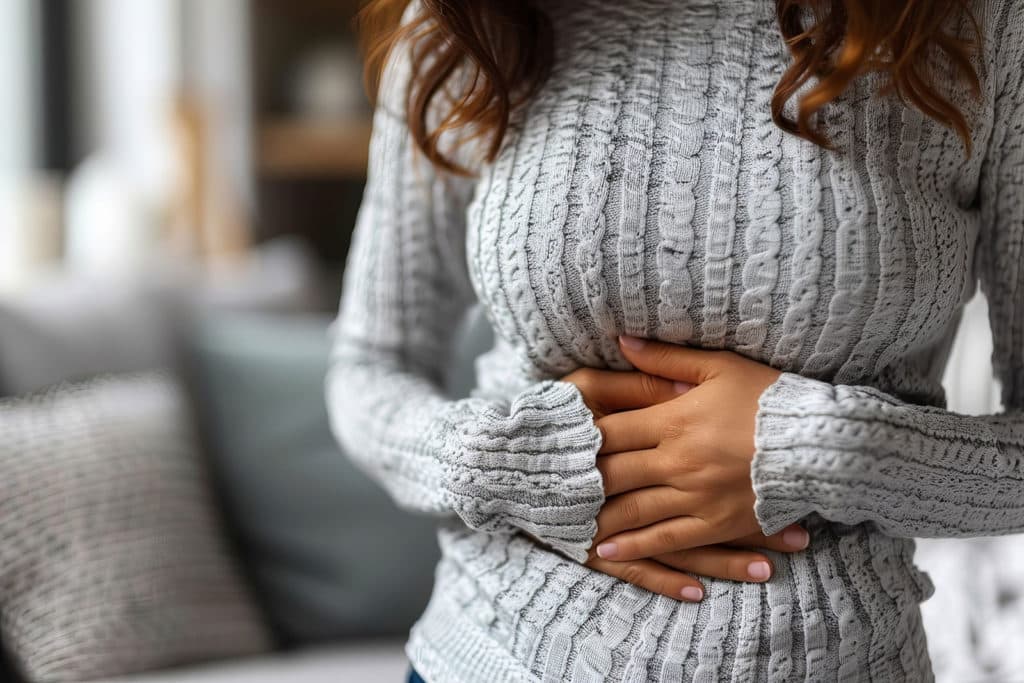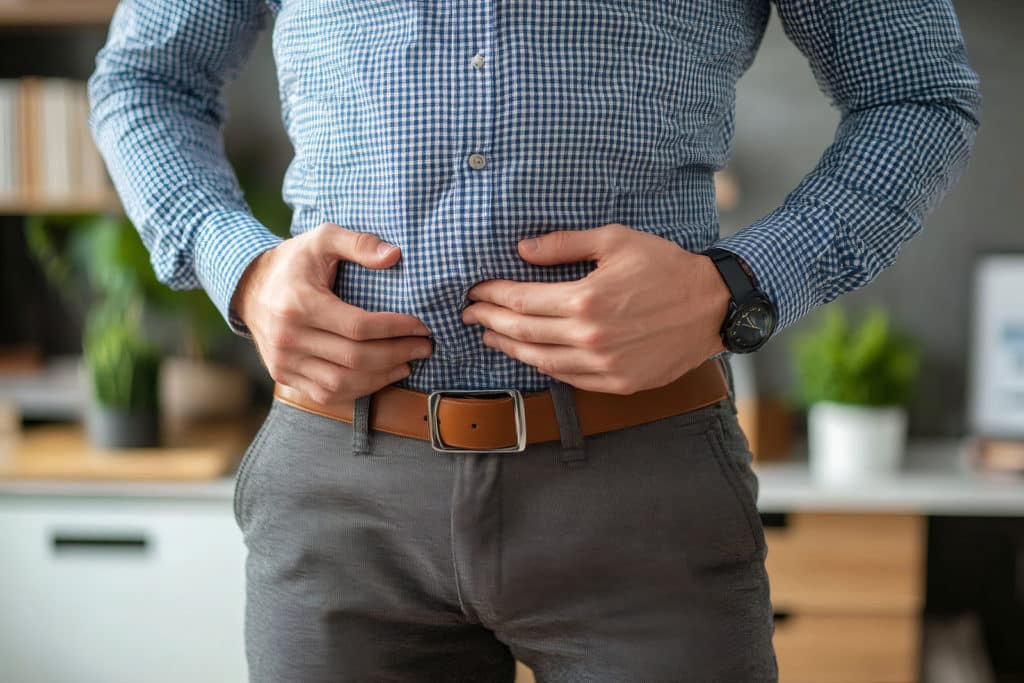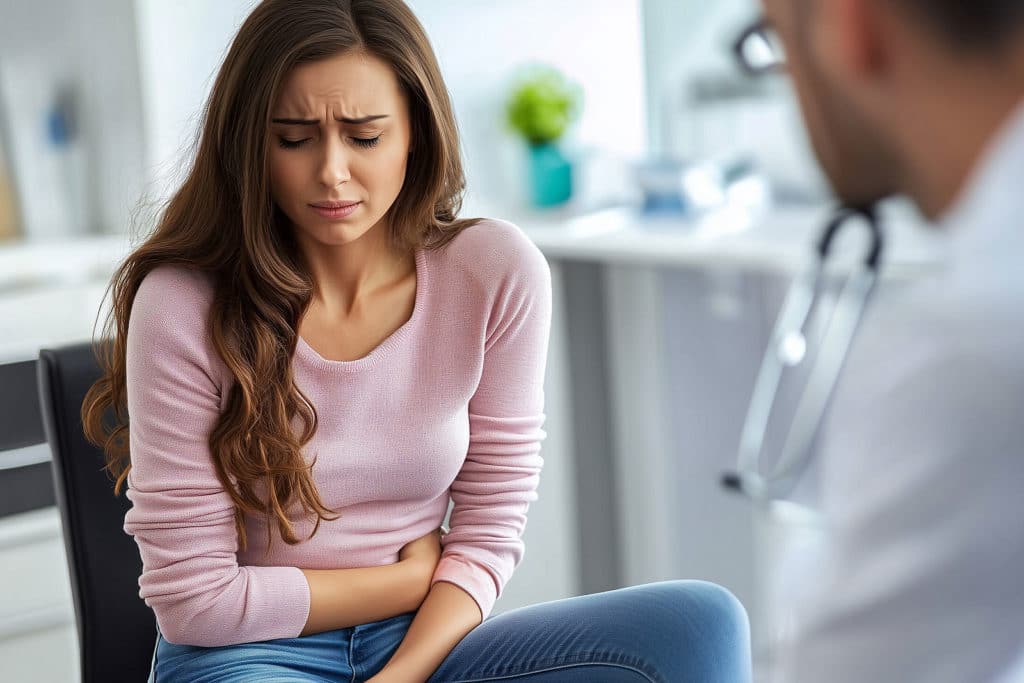One of the most common signs of alcohol addiction—and alcohol consumption in general, beyond obvious inebriation—is bloating.
Regular or excessive drinking can lead to the accumulation of gas or fluid in the abdomen, which causes a feeling of fullness, discomfort, and visible swelling in the stomach area and other extremities, like hands, feet, and face.
This article discusses everything you need to know about alcohol bloating, including questions like when alcohol bloat will go away and how to prevent and treat bloating.
Table of Contents
What Is Alcohol Bloating?
Alcohol bloating is a common side effect of prolonged or excessive alcohol consumption.
Many people call it “alcohol belly” or “beer belly,” referring to the bloated or distended appearance of the stomach area after drinking alcohol. However, alcohol bloating can also affect other parts of the body, like the hands, feet, and face.

For people struggling with alcohol addiction, the bloating appears more prominent due to the body’s prolonged exposure to alcohol and its damaging effects on the digestive system.
The good news is that alcohol bloating isn’t permanent and can be remedied by staying hydrated, not overindulging in salty foods, and stopping or reducing your consumption of alcohol.
What Causes Alcohol Bloating?
Alcoholic drinks like wine, beer, and whiskey are high in calories.
According to the World Cancer Research Fund, one gram of alcohol contains about 7 calories, which is nearly as much as a gram of pure fat.
Mixers like soft drinks and flavorings increase the calorie count even more. A single glass of alcohol might contain anywhere from 50 to 700 calories, depending on the beverage.
Excess calories force the body to metabolize alcohol over other nutrients, leading to slower digestion and temporary weight gain from water retention. High-calorie mixers also spike blood sugar levels, promoting inflammation and fluid retention.
Alcohol can irritate the gastrointestinal tract, resulting in a condition known as gastritis. Alongside bloating, gastritis can cause an array of other symptoms like:
- Heartburn
- Vomiting
- Stomach pain
- Belching
- Blood in stool
- Indigestion
Frequent consumption of high levels of alcohol increases the risk of chronic gastritis. Chronic gastritis causes the stomach lining to become more vulnerable to ulcers and infections, which further aggravate bloating and discomfort.
Inflammation, poor digestion, and reduced stomach acid production can lead to ongoing or hard-to-manage bloating. And though not always permanent, the bloating can become chronic or long-lasting and may require long-term management.
Alcoholic beverages can also indirectly cause bloating by stimulating appetite, leading to the overconsumption of salty or processed foods. High sodium intake suppresses digestive efficiency and promotes water retention, which can lead to bloating.

How Long Does Alcohol Bloating Last?
Alcohol bloating can last anywhere from a few hours to a few days.
People who overindulge in alcohol may take several days to recover, especially if the digestive tract is already inflamed or compromised.
The duration of bloating depends on various factors, such as how much alcohol was consumed, the person’s overall gut health, hydration levels, and whether alcohol is a regular part of their lifestyle.
Here’s a table showing how long alcohol bloating may last under different circumstances:
| Drinking Pattern | Bloating Duration |
| Occasional drinking (small amounts, one to two glasses) | A few hours to 1 day, usually resolves quickly with hydration and light eating |
| Binge drinking (heavy intake at one time) | 1 to 3 days |
| Frequent heavy drinking (several times/week) | 3 to 7 days. Ongoing digestive irritation can prolong symptoms. |
| Chronic alcohol use or alcohol addiction | Persistent or recurring bloating; may not fully go away until alcohol use stops and gut health is restored |
In cases of chronic alcohol use, bloating can be a near-constant issue.
Usually, people who experience alcohol bloating would feel better after drinking water and avoiding alcohol for a few days, but those recovering from alcohol addiction not only have to stop drinking alcohol but also adopt a gut-friendly diet, restore nutrient balance (usually in the form of vitamins, antacids, and/or H2 blockers), and exercise to improve digestion.
If bloating persists even after quitting alcohol, it could be a sign of deeper issues like liver damage or gastrointestinal disorders beyond gastritis.
Factors that Affect How Long Alcohol Bloating Lasts
The amount of time alcohol bloating lasts depends on several factors, including:
- Amount of alcohol consumed: If a person has a small to moderate amount of alcohol, the bloating may last only a few hours to a day. Binge drinking or consuming large quantities of alcohol may cause bloating that lasts for one to three days.
- Hydration levels: If a person drinks water before, during, or after consuming alcohol, they’re less likely to experience long-term bloating.
- Type of alcohol consumed: Carbonated alcohols, cocktails, or sweetened drinks can cause bloating for several days due to the sugar content.
- Digestive health: Naturally, people with healthy digestive systems experience a shorter recovery period as opposed to those with existing gut issues (IBS, chronic gastritis, etc).
- Liver health: Since the liver is directly responsible for processing and detoxifying alcohol, people with liver health issues may experience persistent bloating that can last for several days to weeks.
- Age: Young people often experience shorter bloating periods because their bodies handle alcohol better. Older adults with weakened immune systems experience longer bloating as their bodies are slower to recover from the alcohol’s effects.

How Much Alcohol Can I Drink Without Experiencing Bloating?
There’s no exact answer to this question because it depends on individual factors. However, the National Institute on Alcohol Abuse and Alcoholism (NIAAA) recommends women have no more than one drink per day and men no more than two drinks per day. Here’s what is considered a single drink:
- 5 oz of liquor (80-proof or 40% alc/vol)
- 8 oz of malt liquor (7% alc/vol)
- 12 oz of beer (5% alc/vol)
- 5 oz of wine (12% alc/vol)
How to Prevent Alcohol Bloating
The best way to prevent alcohol bloating is to eliminate or at least reduce alcohol from your diet. If that isn’t feasible, drinking water before, during, and after drinking alcohol can significantly reduce the chance of bloating.
Alcohol is a derelict, meaning that it makes a person need to urinate more frequently. Drinking water regularly replenishes lost water stores and helps ease the inflammatory effects it has on the body.
Pairing alcohol with light, healthy meals and avoiding salty, processed foods can further support digestion and reduce bloating.
Other ways to prevent bloating include:
- Don’t drink alcohol too quickly as doing so causes you to swallow excess air.
- Avoid carbonated drinks. Carbonation equals more carbon dioxide entering your body, leading to bloating. If possible, opt for low-sugar, non-carbonated drinks like wine, clear spirits (like gin or vodka), or light beer.
- Don’t smoke while drinking as inhaling and swallowing smoke causes air to get trapped in your body, resulting in bloating.
- Consume foods that support your digestive system. Add lean proteins (chicken, turkey, fish), easily digestible grains (oatmeal, white rice, quinoa), low-fiber veggies, anti-inflammatory foods (ginger, turmeric, berries), and probiotic-rich foods to your diet.
- Get at least seven to eight hours of sleep every night. Poor sleep causes slow digestion, increasing the chances of bloating after alcohol consumption.

How to Get Rid of Alcohol Bloat Quickly
If you’re experiencing alcohol bloat, here are some ways to get rid of it quickly:
- Drink plenty of water to help flush out excess sodium and toxins from your system.
- Apply a warm compress or heating pad to relax your digestive muscles and relieve bloating.
- Take a light walk or do some gentle stretching. Physical activity can help stimulate digestion and help the body pass gas, which is usually the cause for bloating.
- Drink herbal teas like chamomile, ginger, or peppermint to ease digestive discomfort.
- Take digestive enzymes or probiotics to help the body break down food and drinks.
- Take an over-the-counter gas remedy like Simethicone, Lactase, or Mylanta to encourage gas movement.
FAQs
Can alcohol bloating cause weight gain?
Is alcohol bloating the same as stomach bloating?
Can alcohol bloating happen without drinking a lot?
Can alcohol bloating cause long-term health problems?



